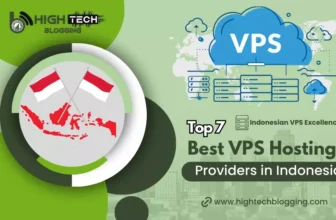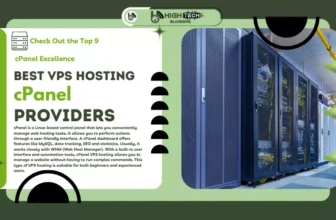Best Free Website Builders, In today’s digital world, having a website is not an option but a must. Fortunately, there are many free website builders that make the process easy.
An Internet presence is the digital equivalent of a business card or a listing in the yellow pages of a phone book. It increases brand awareness and allows you to showcase products and services online.
Unfortunately, not all companies see the benefits of having a website. According to a survey commissioned by Top Design Firms, 27% of small businesses do not have a website, with the main reasons preventing them from having one being cost and lack of technical expertise.
But the good news is that there are plenty of high-quality free website builders out there, many of which require little or no programming knowledge.
Table of Contents
If you don’t know where to look, don’t worry. We’ve compiled the best free website builders. They offer solid features such as SEO advantages, built-in analytics systems, mobile optimization, and professional-looking templates.
These builders are the best option if you’re on a tight budget. And even better? Most of the free website builders we’ll show you have paid options in case you need additional features as your business grows….
Top 17 Best Free Website Builders
1. HubSpot Drag-and-Drop Website Builder
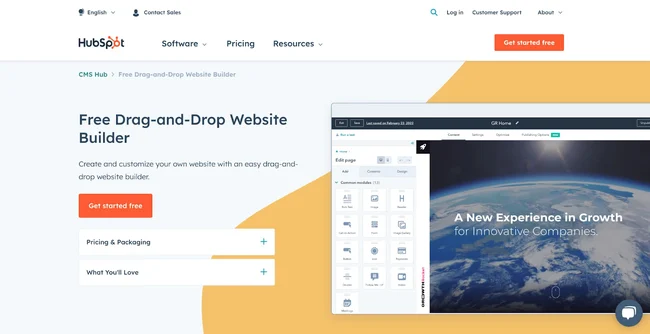
Designing a beautifully branded website doesn’t have to be complicated. If you want to create your own website yourself and have no coding experience, consider HubSpot’s drag-and-drop website builder within CMS Hub.
It comes with everything you need to create a website, including content management system (CMS) tools, themes and templates, security features, and a built-in content delivery network (CDN) to ensure pages load quickly.
The HubSpot builder also connects easily with HubSpot CRM. That allows you to integrate contact forms, live chat requests, and more. This website solution is ideal for companies already using HubSpot’s CRM tool. It’s also great if you want to get started with a website builder that includes marketing, sales, and service software already built in.
As a result, you’ll be able to easily expand the functionality of your website and keep readers and visitors engaged. Whether you want to monetize your audience, build a subscriber list or increase form submissions, HubSpot’s website builder gives you all the tools you need without the need for external integrations.
Whether you run a small business or are just starting a blog, CMS Hub allows you to attract, engage and delight your audience, all while keeping the learning curve extremely low with its intuitive drag-and-drop page builder.
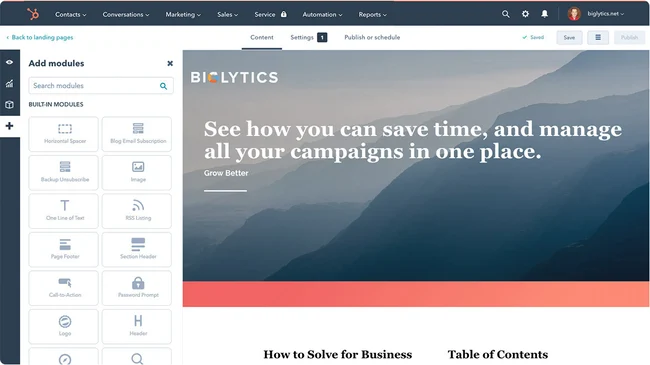
Core Features:
- CMS tools
- Free SSL certificate
- Themes and templates
- Ability to connect to a custom domain
- Built-in security features (malware scanning, website monitoring, and web application firewall)
Pros
Cons
What we love: HubSpot’s website designer connects seamlessly with HubSpot CRM, allowing you to easily integrate your favorite marketing tools with your website.
2. Wix
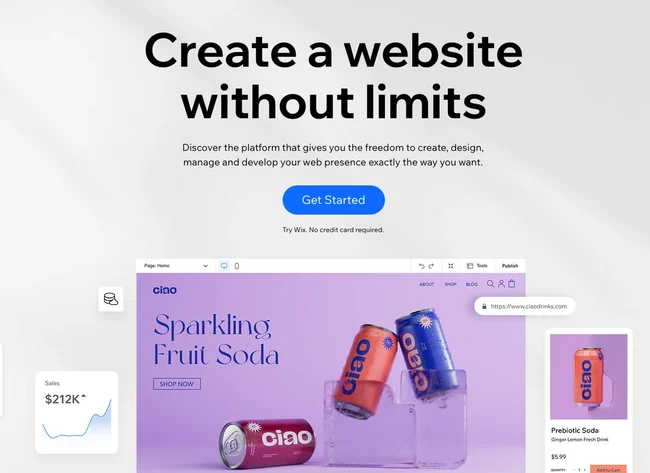
With over 200 million users, Wix is one of the most popular free website builders. The easy-to-use, fully hosted platform offers an easy drag-and-drop editor, an extensive collection of apps, and professional-looking templates.
Wix can even suggest a design for your site using its artificial design intelligence (ADI) software, Editor X.
Core Features:
- A drag-and-drop editor
- Analytics and Reporting
- A large collection of apps and templates
Pros
Cons
What we love: Wix’s ADI software can help you develop a fully functional website in no time. We love that the ADI software can suggest text, fonts, colors, and more.
3. WordPress.com
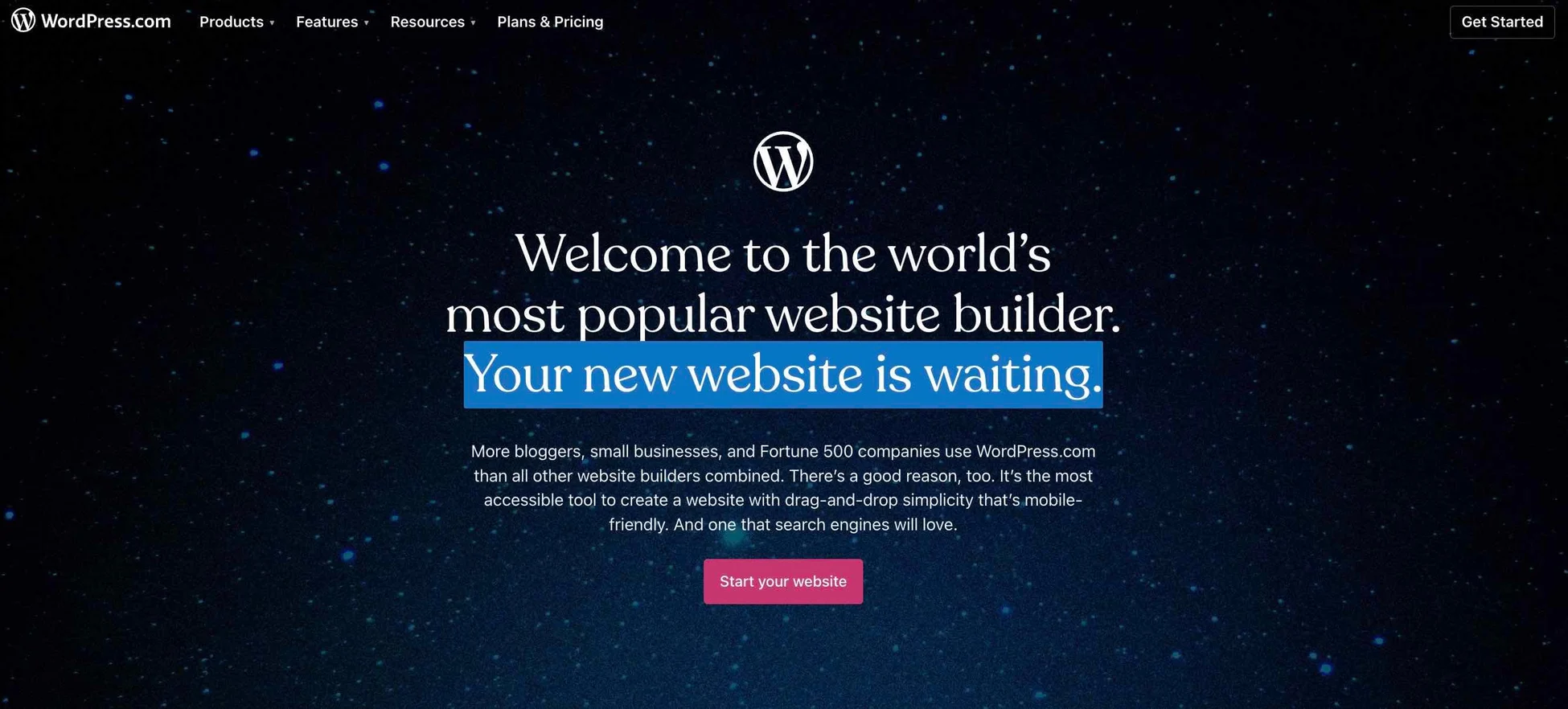
WordPress is the world’s most popular free website builder, with a 43% market share in the content management space. To create websites with WordPress, you have two options: WordPress.org and WordPress.com.
WordPress.org allows you to download the open source WordPress software so you can create and customize a website that suits your needs. However, there are some caveats.
Not only will you need a domain name and hosting before you get the website up and running (which comes at a cost), but you’ll also have to learn how to maintain and secure the website on your own.
WordPress.com, on the other hand, is much easier for beginners to use. It’s a free, fully hosted website-building service offered by Automattic that uses the WordPress framework to provide a hassle-free website-building experience.
The only drawback is that the free version is much less customizable than WordPress.org. For example, you can’t customize plugins, and domain names are limited to [yourname].wordpress.com.
Still, the free version of WordPress.com allows you to create visually stunning websites, blogs, and landing pages using the classic editor or the new powerful block-based Gutenberg editor.
On top of that, you can add assets such as contact forms, videos, and embedded content to WordPress pages using plugins, an add-on feature supported by WordPress but usually managed by another company.
For example, HubSpot offers a marketing plugin for WordPress that allows you to capture leads through WordPress and track them in HubSpot’s free CRM.
Core Features:
- Managed website hosting and security
- Large collection of themes and plugins
- Mobile-friendly and optimized for SEO
Pros
Cons
What we love: WordPress.com easily integrates third-party applications and widgets.
4. Elementor Website Builder

While WordPress makes it easy to create websites for beginners, WordPress page builders make perfecting your website and getting the design of your dreams easier.
Trusted by over 5,000,000 users, Elementor is a drag-and-drop codeless page builder, ideal for quickly creating a custom WordPress website. Choose from hundreds of mobile-optimized page templates without worrying about the underlying code.
Core Features:
- Live editing
- Drag-and-drop builder
- A large library of mobile-responsive templatesMultiple partners build templates and add-ons for Elementor (e.g., Astra)
Pros
Cons
What we love: With Elementor, you don’t have to be a professional to edit your site. Live editing makes adding a quick update or changing your website a breeze.
5. Webnode
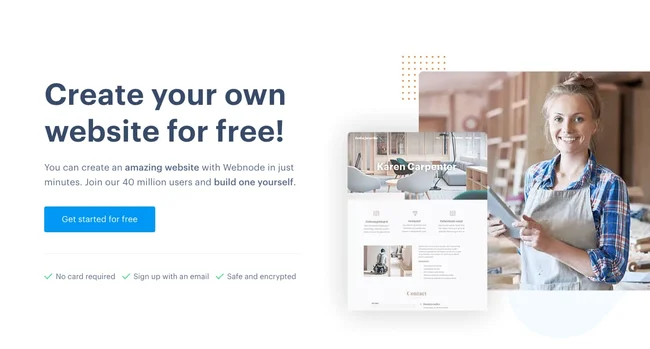
With over 40 million users, Webnode is one of the most popular website creation tools for good reason. It’s affordable, easy to use, and supports multilingual websites – up to 20 different languages.
Webnode is perfect for personal, professional, and small business websites, as it supports e-commerce stores.
Core Features:
- Mobile-ready
- Ecommerce support
- Pre-designed templates
Pros
Cons
What we love: We appreciate that Webnode supports multiple languages. This makes it possible to expand its strategy to include non-English speaking markets.
6. Jimdo
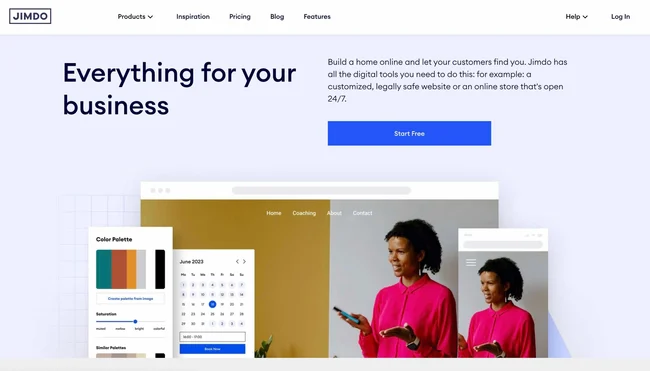
Founded in 2007, Jimdo is a German company that offers artificial intelligence-based website-building tools for small independent businesses. The builder, the Dolphin, asks users questions and suggests designs based on their answers.
If you’re curious about what these AI-based designs look like, Jimdo shows some examples on their site.
With 500 MB of space, you’ll probably have more than enough to build your site, and it even provides HTTPS/SSL encryption, which means your visitors’ information will be kept secure. Plus, you can seamlessly integrate your site with social media accounts.
Jimdo is also an excellent choice for international businesses because it allows you to create mobile-optimized websites in more than nine languages.
Core Features:
- SSL encryption
- GDPR-compliant
- Mobile app available
- AI-powered website builder
Pros
Cons
What we love: We love Jimbo’s AI website builder. The AI questionnaire and suggestions are helpful for users who don’t know exactly what they want from their website.
7. Mozello
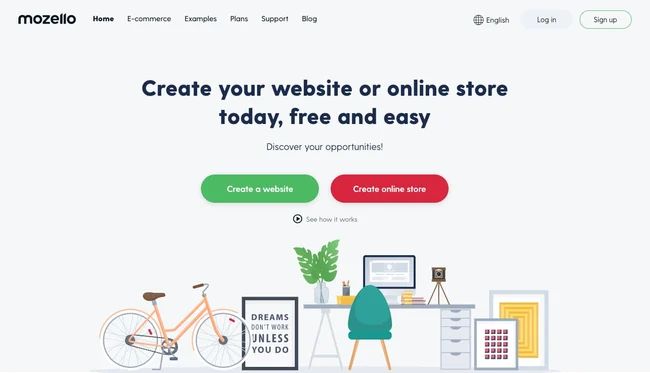
Mozello has all the basic features you need to build a website: a drag-and-drop editor, a template library, and e-commerce functionality. One of Mozello’s biggest plus points is that the builder allows you to create a multilingual site for free.
You can see examples of websites created with Mozello on its portfolio page.
Core Features:
- Template library
- Drag-and-drop website builder
Pros
Cons
What we love: Mozello is a website builder for e-commerce. Use Mozello to turn your website into a digital storefront.
8. Yola
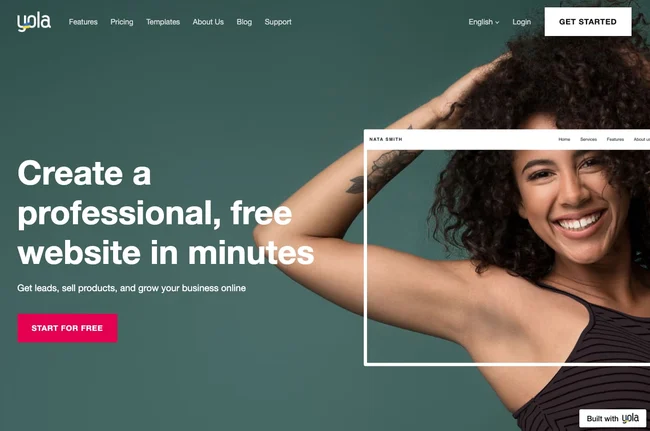
Founded in 2007, Yola is a free website builder created to simplify website creation.
It includes a drag-and-drop builder, hundreds of customizable and mobile-optimized templates, and pre-designed blocks that allow you to create all kinds of websites, including online stores.
Core Features:
- Free customizable templates
- A drag-and-drop website builder
- Support for multilingual websites
Pros
Cons
What we love: We love that Yola takes the stress out of creating a website. Yola has many customizable templates that make creating a website a breeze.
9. Weebly
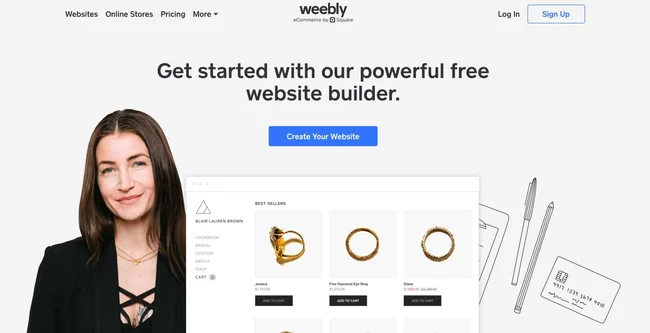
Weebly is an open-source software-as-a-service (SaaS) solution that offers web hosting, domain registration, web design, and e-commerce features. Weebly is ideal for enterprises and startups.
For a free website builder, Weebly is especially flexible. It is compatible with all devices and platforms and easy to use.
Like Wix, Weebly has drag-and-drop functionality, an integrated CMS solution, and hand-coded HTML files. The internal editor includes SEO tools and Google Analytics.
Core Features:
- SEO tools
- Free SSL certificate
- Drag-and-drop editor
- Analytics and Reporting
- Integrated CMS solution
Pros
Cons
What we love: Weebly has many useful SEO tools and resources to get you started with an SEO strategy. Take advantage of Weebly’s SEO tools to improve your website’s ranking on Google and other search engines.
10. Webflow
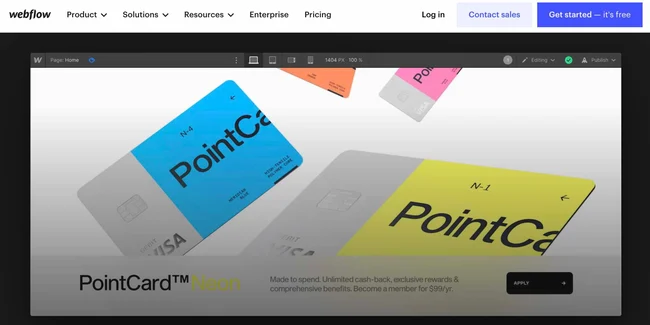
While most of the other builders on this list are for people without a ton of coding knowledge, Webflow specifically targets power users, designers, and agencies that require a solution that gives them more design freedom than traditional website builders.
Although it is a complex tool, Webflow tries to make it as easy as possible to get your company online. You can also explore a library of Web sites created with Webflow that you can reference.
Core Features:
- Third-party integrations
- A drag-and-drop website builder
- Widgets to add features like maps and media
Pros
Cons
What we love: While we love that many free website builders appeal to those with no coding skills, we appreciate that Webflow caters to more advanced users. Advanced users on Webflow can fully customize their web pages to their desired aesthetic.
11. Ucraft
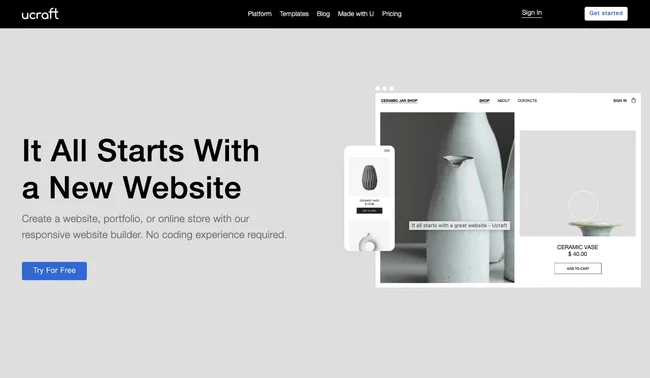
Ucraft is one of the most advanced and generous website builders on the list. Like the others, it has a drag-and-drop editor, a good selection of templates, and supports e-commerce functionality.
However, Ucraft stands out because it allows you to connect an existing custom domain name with its free plan. It also includes an SSL certificate and unlimited storage. Ucraft’s portfolio page shows sample websites built by their customers.
Core Features:
- Free hosting
- A drag-and-drop editor
- Ecommerce functionality
Pros
Cons
What we love: We love that Ucraft allows users to connect existing custom domains to their free plan. This will potentially save users money in the long run.
12. SITE123
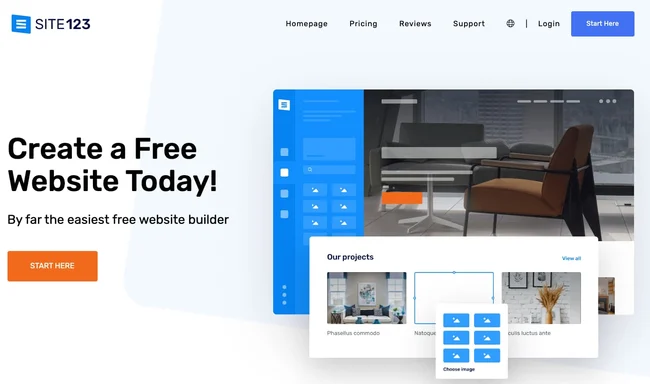
True to its name, SITE123 allows you to create a website in as little as one, two, and three steps. After setting it up with a one-click setup wizard, you can customize your SITE123 website with a free library of images, graphics, and templates.
In addition, SITE123 offers web hosting, domain registration, and 250 MB of storage space, so you won’t feel pressured to switch to a paid plan.
Core Features:
- Free image and icons library
- Mobile-responsive design
- Free hosting and domain
Pros
Cons
What we love: SITE123 is truly a simple website builder. We love that this website builder is easy to use and appeals to users who want a website without all the extra bells and whistles.
13. Strikingly
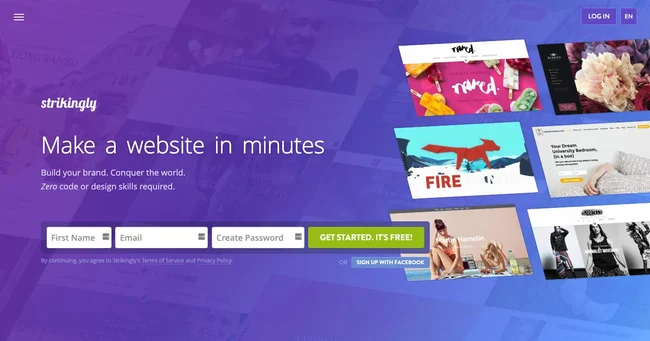
Launched in 2012, Strikingly is one of the newest website creation tools on the list. It helps users create websites without the need for programming skills. Strikingly differs from its competitors in that it specializes in single-page websites, such as portfolios, event pages or landing pages.
The free plan includes unlimited free sites, a modest 5 GB monthly bandwidth, 500 MB of storage, and a branded domain.
Core Features:
- Analytics
- Ecommerce tools
- A library of mobile-optimized templates
Pros
Cons
What we love: Strikingly is a great option if you are looking to build a landing page for your product or service.
14. GoDaddy
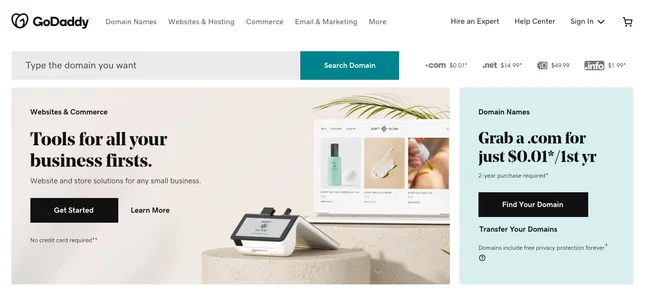
While GoDaddy is a brand synonymous with affordable web hosting and domains, it has expanded its offerings to include an all-in-one website creation tool for beginners and small business owners who have purchased hosting and domains.
The website builder is basic but has everything you need to create a functional website. It includes a drag-and-drop editor, simple and clean templates, an SSL certificate and social networking tools.
Core Features:
- 24/7 customer support
- A drag-and-drop website builder
- Marketing and analytics dashboard
Pros
Cons
What we love: GoDaddy is the complete package for those who want to create a website. GoDaddy offers not only a website builder, but also domains and web hosting.
15. Appy Pie Website
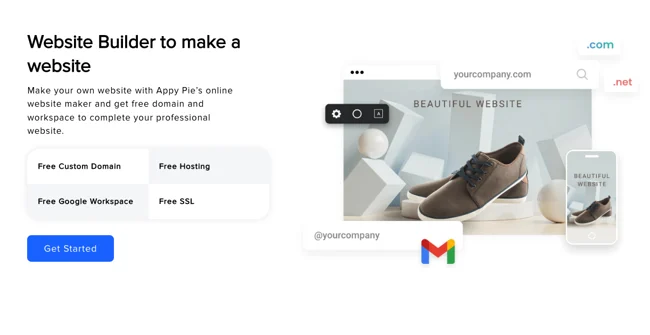
Appy Pie’s website builder has a drag-and-drop interface that allows you to create well-designed, highly functional, and professional websites without any coding or programming skills.
All websites created with the Appy Pie website builder are lightweight, fast, and secure to ensure a better user experience and complete customer satisfaction. And since they consume little data, all Appy Pie websites can deliver content without any Internet connectivity.
Appy Pie has plenty of ready-to-use templates, design themes and a visual library to make it easy for users to develop websites at competitive prices.
In addition, the Appy Pie Website Builder also provides a rich library of FAQs and video tutorials. You can easily deal with most of the problems without having to call customer support.
Core Features:
- Cross-platform accessibility
- A no-code website development tool
- Thousands of pre-built templates and designs
Pros
Cons
What we love: Appy Pie provides users with many ready-to-use templates, layouts, and a visual library. Using the templates and layouts, users can create a website that stands out from the competition.
16. MailChimp
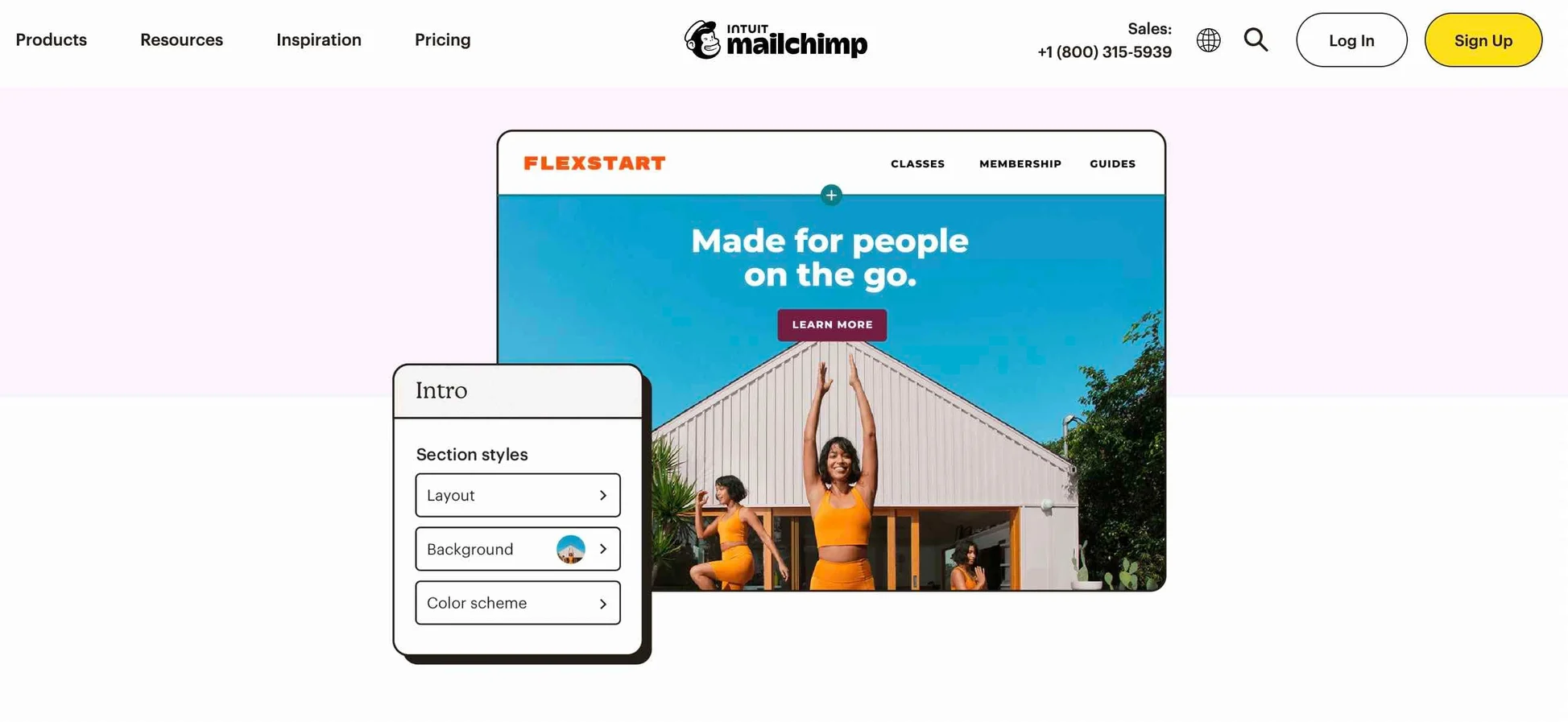
MailChimp is no longer just an email marketing tool. Now, MailChimp is your one-stop shop for all things marketing, including building your basic free website.
If you’re familiar with MailChimp’s interface for email marketing, you may recognize the same interface features in their website builder. MailChimp’s website builder features a drag-and-drop interface, which means you can quickly design your website to match your preferred aesthetic.
Core Features:
- SEO ready
- A drag-and-drop editor
- Email marketing integration
Pros
Cons
What we love: Users of MailChimp’s email marketing service can easily integrate email marketing into the MailChimp website.
17. WebStarts
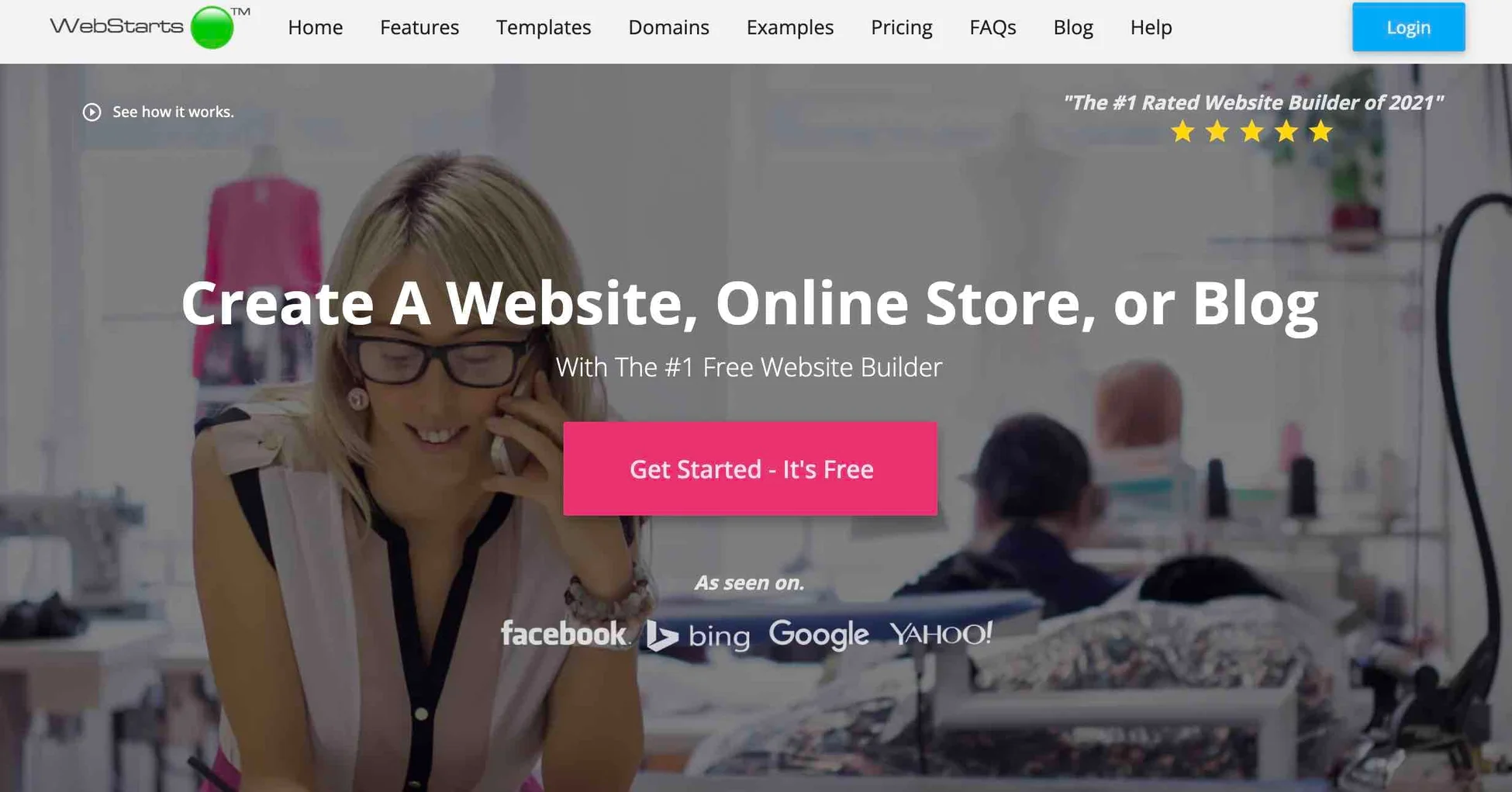
Don’t let the WebStarts home page fool you – Webstarts is a promising and, more importantly, free website builder with plenty of live support to get you started.
WebStarts does not require the user to have coding knowledge or HTML experience. Although there is a learning curve, its drag-and-drop interface allows users to create a Web site entirely on their own.
This website builder includes everything you need to get your website up and running, including applications for creating forms, calendars, music playlists, maps, SEO and more.
Core Features:
- Online store
- Mobile ready
- Automatic domain setup
Pros
Cons
What we love: WebStart users do not have to build their website alone, especially if they have questions or need technical assistance. We thank WebStart for providing live assistance to its customers.
Website Builder Features You Need
Choosing a website creation tool is easier when you know what you are looking for. Here are the features you should consider.
Themes and Templates
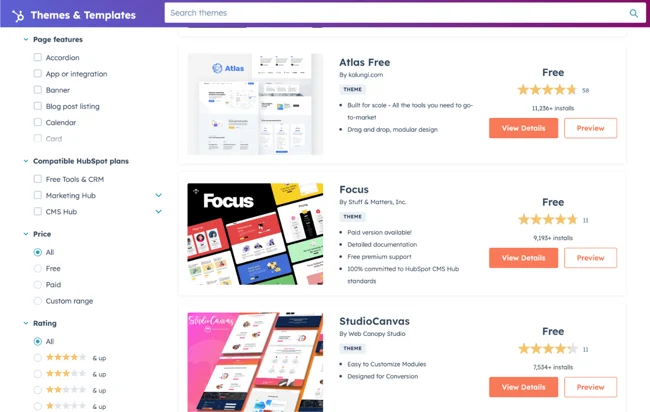
Having a wide variety of fully customizable themes and templates in the website builder theme marketplace makes it easy for users to change the look and feel of their site.
In that sense, website builders should have theme options that cater to specific niches so that users don’t waste time creating new templates from scratch. For example, the website builders on our list have options for blogs, portfolios, e-commerce websites, and more.
Templates should be pre-structured and pre-populated with images, text, and other elements common to websites. For example, every site needs a home page, an information page, and a contact page. All you have to do is choose one and replace the sample content with your own.
Themes and templates should be easy to customize, with multiple options for backgrounds, layouts, fonts, and colors.
Media (Video, Photo, Audio, and Graphics)
A text-only website can become monotonous, so including different forms of media helps break up the text and make the information stick. Fill your website with highly engaging multimedia content and graphics to support vital information and engage users.
You can easily bring your website to life using visual aids and media such as stock photos, vector images, background images, stock video footage, sound effects, and video editing templates. There are tons of websites that offer free multimedia resources. Freepik is a well-known website that offers illustrations and images.
Many sites also incorporate icons on their pages, such as in the call-to-action and resource sections. Flaticon is a great source of icons.
Using these resources will transform your website into something memorable and visually appealing while providing a user-friendly experience.
Some website builders offer more powerful multimedia features, with multiple gallery layouts, customization options, and editing functions.
WYSIWYG Editor
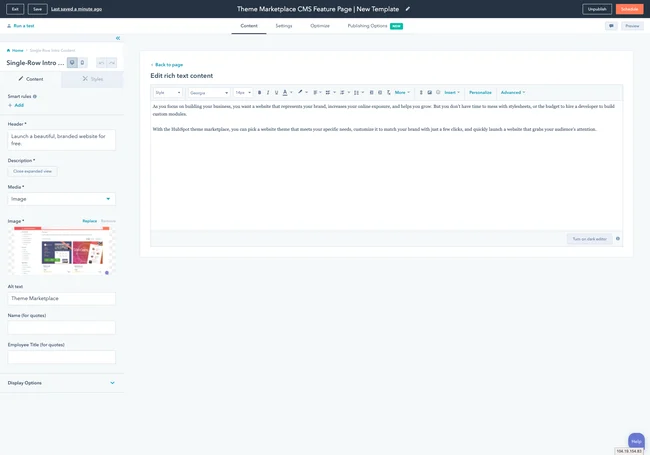
In addition to an assortment of themes and templates, the best website creation tools make it easy for users to customize their websites with drag-and-drop tools and “what you see is what you get” (WYSIWYG) editors.
There is no need to learn how to code when you can update your site in a few clicks. Simply drag and drop elements onto the page and see the changes implemented on your website immediately.
Malware Scanning
Security is one of the most important aspects when choosing a website builder.
Security features vary depending on the website builder tool you choose, but consider it a good choice if it offers malware scanning. Automatic malware scanning allows you to deal with threats before they become catastrophic.
Web Application Firewall (WAF)
A web application firewall (WAF) is another must-have security feature.
WAFs sit between your web server and the Internet to protect your website from the most common attacks. You can prevent SQL injections and cross-site scripting (XSS) by filtering, monitoring, and blocking malicious traffic entering the network.
WAFs can come in the form of software as a service (SaaS), and you can customize them to meet the unique needs of your website.
Content Delivery Network (CDN)
In addition to site security, you should also consider page speed optimization. After all, it affects everything from customer experience to conversions and revenue.
According to Portent, a site that loads in one second has a conversion rate 5 times higher than a site that loads in 10 seconds.
There are many ways to improve page speed, and a content delivery network (CDN) is one of them. CDNs store heavy, static content on servers distributed around the world and load the cached content from the location closest to the user to speed up delivery.
Web Hosting
What good are website builders if they can’t get their website online?
Some solutions only offer website creation tools. You have to pay separately for web hosting services to get your site online.
The best website builders make it easy to create websites by offering web hosting. Free website builders offer limited bandwidth and storage for personal use. You can switch to shared, dedicated, or managed hosting for an additional cost.
Storage
Web hosting works by providing two services: bandwidth and disk space (or storage).
Most free website builders offer ample (limited) storage for a starter site but force you to buy additional storage in case you need it.
Blogs
People often confuse websites and blogs: they are similar, but they are not the same.
A blog is a type of website that contains information on different topics. They are often updated with new articles or posts, while websites only receive updates when necessary. Simply put, all blogs are websites, but not all websites are or have blogs.
Organizations build websites for different reasons: to sell, to show a portfolio, or to inform, and for those reasons, a blog can be useful.
Blogs can help your website:
- Generating new leads.
- Increasing visibility through SEO.
- Building trust and loyalty.
- Creating brand awareness.
Most free website builders include basic blogging tools and features for creating posts and managing comments.
SEO Capabilities
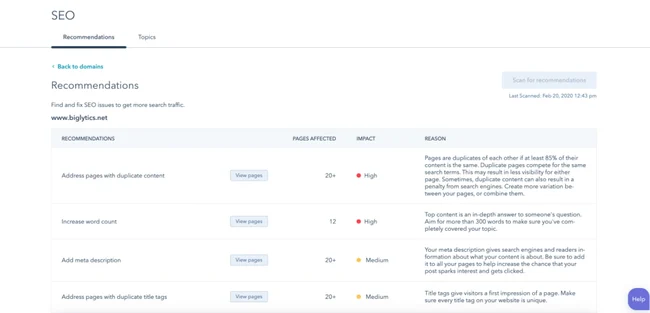
According to BrightEdge, 53% of traffic comes from organic searches. If you want to attract more traffic and visitors, your website must be optimized for search engines.
Most website builders help with technical SEO by offering free SSL certificates and supporting schema markup and XML sitemaps. They also support on-page SEO by allowing you to enter and modify URLs, meta tags, and alt attributes of images.
Customer Support
Al utilizar las herramientas de creación de sitios web, es probable que te encuentres con un problema que no puedas solucionar. Ahí es donde entra en juego el servicio de atención al cliente.
Customer support helps you with anything you need: technical, sales, billing, payment or experience. Depending on the website builder, support can come in any (or a mix) of the following channels:.
- Chatbot support.
- Live support.
- A knowledge base.
- Video tutorials.
- FAQs.
The best website builders maintain a mix of channels and respond to inquiries promptly.
Ecommerce Capabilities
Do you plan to sell physical or digital products in the future? Consider choosing a website builder with e-commerce features.
There are dedicated e-commerce website builders, but they are often payment solutions with robust features, such as payment and shipping applications.
Free website builders often integrate with a third-party e-commerce application or support a simple built-in store.
Third-party Integrations
There is nothing worse than realizing that your existing technology stack does not work with your chosen website builder. Therefore, it is crucial to consider whether a website builder allows third-party integrations.
Your website builder must integrate with external tools, such as email marketing, e-commerce, and social software.
Analytics and Reporting
Your website builder should also have an analytics and reporting feature to measure important metrics such as popular site pages, bounce rate, average duration per visit, etc.
You can also track your website metrics in an analytics and reporting tool. By bringing web analytics data together in a dashboard with other key funnel metrics, such as testing or activation rate, all team members will be able to explore the data and discover new insights.
Conclusion
Having a website is crucial in today’s digital world. Free website builders like HubSpot, Wix, WordPress.com, and others provide an opportunity for individuals and small businesses to establish an online presence without high costs or technical expertise.
These builders offer templates, customization options, mobile optimization, SEO benefits, and e-commerce functionality. While free versions have limitations, they provide a solid foundation. Premium plans with advanced features are available as your business grows.
These builders are accessible and cost-effective for small business owners, bloggers, and individuals to create impressive websites, reach their audience, and enhance their online presence.
FAQs
Do free website builders provide SEO advantages?
Yes, many free website builders offer built-in SEO (Search Engine Optimization) features or plugins that help optimize your website for better search engine visibility. These features often include options to add meta tags, optimize page titles and descriptions, generate XML sitemaps, and customize URLs.
By utilizing these SEO tools and following best practices, you can increase the chances of your website appearing higher in search engine results, driving more organic traffic to your site.
Can I sell products or services through my website, created with a free builder?
Absolutely! Several free website builders, such as Wix, offer e-commerce functionality that enables you to create an online store and sell products or services directly from your website.
You can manage inventory, process payments, and track orders using these built-in features. E-commerce capabilities vary between builders, so it’s important to explore their specific offerings to ensure they meet your requirements for selling online.
Do I need technical expertise or coding skills to use free website builders?
No, free website builders are designed to be user-friendly and accessible to individuals without technical expertise or coding skills. They often provide intuitive drag-and-drop editors and pre-designed templates, allowing you to create and customize your website easily.
By simply selecting elements, adding content, and arranging them on the page, you can achieve a professional-looking website without writing a single line of code.
Can I make my website mobile-friendly with a free website builder?
Yes, most free website builders offer mobile optimization features, ensuring that your website is responsive and displays properly on various devices, including smartphones and tablets.
With the increasing number of people accessing the internet through mobile devices, having a mobile-friendly website is crucial for providing a seamless browsing experience to your visitors, regardless of the device they use.
What if I need help or support while building my website?
Free website builders typically provide support through documentation, tutorials, and community forums. Some builders also offer email or live chat support. Additionally, you can find helpful resources and guides on their websites to assist you in the website creation process.
If you encounter any issues or have specific questions, reaching out to their support team or seeking assistance from the builder’s community can help you overcome challenges and make the most of the platform’s features.
Mike DaVinci HighTechBlogging.com
Mike DaVinci is a skilled content writer with a talent for storytelling. He specializes in creating captivating narratives that engage readers and leave them feeling inspired. His writing has been featured in various publications, including magazines, blogs, and business websites. Mike’s particular interest in human interest stories allows him to uncover the heart of any story and convey it to his readers in an emotional and authentic way. He believes that storytelling is a powerful tool for connecting with people and inspiring positive change in the world.
To read more similar articles, click here
Thanks for visiting our Website. If you appreciate our work, kindly show us some support in our comments section. 🙂


